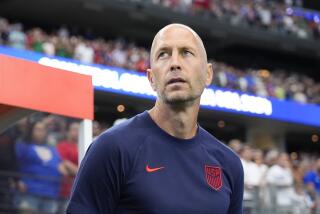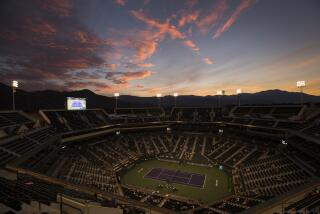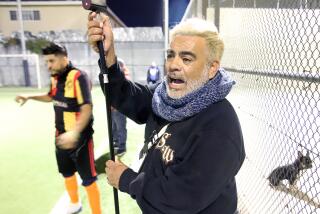A DARK DAY IN PARAGUAY : 2 Years Ago, a Player Named Hugo Chapacu Shocked Jimmy Arias to Help Give His Country a Davis Cup Victory Over the United States
- Share via
The drumbeats of Paraguay, 1987, still pound in Jimmy Arias’ head. They are his migraine. Aspirin doesn’t make them go away.
He can tell himself that it was only a tennis match. His family and friends do that. He can tell himself that he hadn’t even turned 23 years old at the time, so how devastating should this be? What about the resilience of youth? How long should the hurt hurt?
Yes, this was more than a Friday afternoon quarterfinal at some Shady Oak Tennis Club in Suburbia, USA, where the most at stake is $10,000 and a couple of rungs on the ranking ladder.
Yes, this was the Davis Cup, team tennis for real, where the other guys along the sidelines wearing the same uniform as you really cared whether you won or lost. And so did a country full of tennis fans. A big country.
But shouldn’t the drumbeats stop soon? Worse, why had he ever let them start?
It was all so simple. He was among the best tennis players in his country. In fact, he was ranked as high as No. 5 in the world in 1983, at 17. The Davis Cup captain, Tom Gorman, had picked him to play against Paraguay because he was good. He deserved the spot, as did his teammates, Aaron Krickstein, Ken Flach and Robert Seguso.
They would play March 13, 14 and 15, on the slow red clay in Paraguay, at some place in Asuncion called, rather strangely and inappropriately, the Golf and Yacht Club. They had to play in Paraguay because they lost a coin flip. Pretty basic, these Davis Cup rules.
But Arias and Krickstein were America’s clay court aces at the time, and Flach and Seguso had never lost a Davis Cup doubles match.
So the attitude was, pretty much, don’t worry, be happy, even though John McEnroe referred to these early-round Davis Cup matchups off in the jungles as “banana republic tennis.” And even though Gorman was sounding like a coach, talking about the need to be careful when you didn’t have the home-court advantage. After all, Paraguay wasn’t exactly throwing Smith and Lutz or Laver and Rosewall out there against them.
There was Victor Pecci, a veteran who was, at 31, well into the down curve of his career. There was Francisco Gonzalez, also 31, the former Ohio State player and doubles specialist, who, Gorman claims to this day, “keeps a post office box in Paraguay and spends 6 hours a year there, or whatever it takes to get on their Davis Cup team.”
Pecci made it to the French Open final in 1979. Gonzalez beat Jimmy Connors in a final in 1980. Since then, the pickings had been slim for both.
And then there was Hugo Chapacu. Just the mention of his name starts the drumbeats in Arias’ head. For everyone else, mention of his name draws blanks.
As TV commentator Fred Stolle, the Australian with the wonderfully dry wit, said on ESPN in his pre-match summing up: “Hugo Chapacu. I really don’t know him.”
Ah, but he would. And so would Arias, much to his everlasting dismay.
Even now, nearly 2 years later, as the great rematch is about to take place--the United States versus Paraguay in Davis Cup tennis next Friday, Saturday and Sunday at the Sonesta Sanibel Harbour Resort in Ft. Myers, Fla., Arias remains dismayed. As do Gorman, the United States Tennis Assn., and probably a million or more tennis followers who stayed tuned to ESPN into the late hours of Sunday, March 15, 1987, and the early hours of Monday, March 16.
THE MATCH
Arias’ first look at Chapacu was on film, just before the team left for Paraguay.
“Aaron and I looked at him against Italy in their previous match,” Arias said. “He got beat something like 6-1, 6-0, 6-2. We thought he was a joke.”
But Krickstein was laughing a lot less the first day, after Chapacu had taken him to 6-4 in the fifth set before bowing. And when Pecci beat Arias in 4 sets and Flach and Seguso had to battle back from 2 sets down to win the doubles over Pecci and Gonzalez with a 6-4 closing set, this “banana republic” stuff suddenly was no joking matter.
The crowds at the Golf and Yacht Club were unruly from the start. At one point during the doubles, Flach, a highly emotional player, slapped a ball into the crowd in the direction of a man making cat sounds. That prompted other fans to start barking like dogs at the American players. Flach also yelled at Gonzalez over a close point and the 6-foot 4-inch Gonzalez spat in the direction of Flach.
So, when Arias took the court Sunday to play Chapacu, with his team’s lead a slim 2-1, it wasn’t in warm surroundings. The pressure was on him, even though his match wasn’t the finale. Smart money had the veteran Pecci beating Krickstein in the closing match. Pecci had never lost a Davis Cup match in Asuncion, and he was playing as if he liked that streak.
“I kept saying to myself, ‘Who is this Chapacu?’ ” Gorman said.
Chapacu quickly took the first 2 sets from Arias and actually got to a match point with Arias serving at 4-5 in the third.
Chapacu was 24 years old then, was ranked No. 290 in the world and had amassed total winnings of $3,953.
Arias won a million dollars before his 20th birthday, ranked in the world’s top 10 for 3 years, was the top-seeded player in the 1984 Los Angeles Olympic tournament and had victories over many of the game’s biggest name players.
But Chapacu was knocking him around as if he were a punching bag.
Somehow, Arias rallied, saved the match point, won the third set and went through Chapacu in the fourth like someone in a hurry to catch a bus.
“He came back from the dead,” Gorman said.
Once out of the grave, Arias kept rolling. Reality had returned. Chapacu was playing at his own level, which was well below world class. Arias took a 5-1 lead and the ESPN broadcasting crew, Jim Simpson, Cliff Drysdale and Stolle, were winding up the microphone cords in the TV booth and inviting fans to stay tuned for a hockey game.
“We want to give a final thanks to the people here at the Golf and Yacht Club for their help . . . “ Simpson said, as Chapacu served to Arias at 1-5. The match was just reaching the 4-hour mark at that point. Little did Simpson know he still had nearly 1 1/2 hours of broadcasting left.
Chapacu held serve, but there seemed to be no signs of any turning in the match until the crowd, perhaps merely wanting to kick up some ruckus before the expected quick end arrived, got rowdy. At one point, Arias missed his first serve, but was allowed 2 more because the crowd noise had been disruptive after the first.
That prompted a long delay, an argument by Paraguay’s captain with the chair official and an announcement over the public address system that the crowd could cause Chapacu to lose points if it didn’t settle down.
Play began again, Arias got to a match point and blew it with a backhand into the net. Then he hit a big forehand shot inside the line on Chapacu’s backhand side that was called out by the linesman. Arias protested and so did Gorman.
“I got up and walked to the chair,” Gorman said. “But the umpire kind of waved me away, saying it’s OK, that he knows it was a wrong call and he will overrule. So I go and sit down and the next thing I know, instead of another match point for Jimmy, he’s saying advantage Paraguay.”
Arias added: “That’s when it really got going, when everything got out of control. And the thing was, I wasn’t as upset about that call as I was that he had returned a shot earlier in the point long on the baseline and they hadn’t called that. I could have shown them the mark. That’s the one that really ticked me off.”
Gorman remembered that, too.
“Jimmy had won the point twice, and he never got it,” Gorman said.
Quickly, the strange degenerated into the bizarre:
--Arias lost 2 more match points in the next game and Chapacu, who minutes earlier looked like a man just finishing a marathon, now looked like a sprightly gymnast, about to start a routine.
--Teen-agers who had carried a huge kettle drum halfway up the bleachers began a constant pounding beat. If Arias missed a first serve, they beat the drum. If he looked their way, they beat the drum. If he missed or Chapacu scored, they beat the drum.
--At the break at 5-4, with Arias about to serve for the match for the second time, a short, stocky man wearing a bright yellow T-shirt and an eerie-looking Ronald Reagan mask jumped out of the crowd at him.
“I almost wet my pants,” Arias said.
--Arias took a 30-love lead and then, as the match drifted toward the 5-hour mark, the drum seemed to get louder and suddenly the crowd was waving Paraguayan flags. Chapacu broke serve and pulled even, 5-5.
--Now the ESPN crew, sensing the dramatics, was playing to it. Referring to Arias serving at 5-4, Drysdale said, “I cannot think of any more difficult circumstance for an individual athlete to be in.”
--With Arias serving at 5-6, he was called for a foot fault on a second serve that would have given Chapacu 2 match points at 15-40. Incredibly, the chair umpire overruled and gave Arias 2 more serves.
On the next point, Arias hit a shot wide--tapes clearly show that. The linesman called it that way and, incredibly again, the chair umpire overruled and gave Arias 2 serves again. Finally, Arias held serve for 6-6.
“I never saw 2 points replayed like that in such a situation,” Drysdale said.
--Chapacu then played a terrible game, Arias won and served for the match, for the third time, at 7-6.
Stolle, who has won 2 Wimbledon doubles titles, played in numerous Davis Cup situations for Australia and watched the likes of Emerson, Laver and Rosewall from close proximity, said, “This is perhaps the most exciting tennis match I’ve ever been a part of.”
--As Arias played badly and lost to make it 7-7, police surrounded head official Kurt Nielsen of Denmark, protecting him from angry fans who were still protesting a close call that had gone against Chapacu in a previous game.
--Chapacu won to go up 8-7, but before Arias could go back out after the break to serve, Davis Cup officials had to remind the local workers who were sweeping the clay on the court, smoothing it down every 2 games, to sweep Arias’ side, as well as Chapacu’s.
--Chapacu reached his third match point when Arias did the unthinkable by double-faulting. But Arias fought it off momentarily.
Then finally, on his fourth match point, 5 hours 23 minutes after the match began, Hugo Chapacu watched Jimmy Arias’ forehand sail long, giving him the biggest victory of his life, 9-7 in the fifth set.
And so it had happened. David had slain Goliath. Fantasy had outpaced reality. Hugo Chapacu had his one moment in time, and Whitney Houston hadn’t even sung the song yet.
THE AFTER-MATCH
Chapacu was mobbed and carried from the stadium. He appeared, in his exhaustion, to be unable to fight off his handlers, to do little other than to just let the wave sweep him away. Close behind were 2 teen-agers, carrying the kettle drum.
“The drum, I still remember how it sounded,” Arias said.
Somehow, Arias got through the melee to shake Chapacu’s hand, then eventually headed for the locker room.
“You had to walk from the stadium through an open area next to the stands,” he said. “I got outside and somebody threw a brick at me from the stands above. It just grazed my head and I took off running. I never told anybody that before.”
It was close to midnight when the Arias match ended. Nevertheless, Pecci and Krickstein took the court shortly thereafter for match No. 5. It was really no contest. Pecci won in 3 sets.
“I didn’t think Aaron should play then,” Arias said. “I think he had his choice and could have played the next day. After what had happened to me, I don’t think he should have gone out there.”
Gorman said he didn’t think Krickstein had a choice, that the match schedule that night had been predetermined by the rules.
“I still thought he had a good chance to win,” Gorman said. “But looking back at it now, even though it was a fairly close match in the beginning, he was in a pretty tough spot.”
Arias said that, in retrospect, he played it wrong against Chapacu.
“I was holding everything in,” he said. “Gorman told me to do that, to not get the crowd mad. So I did, even though I was burning inside. I remember when I was up, 5-1. All I wanted was that one last point, so I could just tell that crowd where to go.
“I really wanted to let everything out. I needed to.”
Also in retrospect, Gorman agreed.
But he had seen Arias lose a previous Davis Cup match to Andres Gomez in Ecuador in 1986, when Arias got into bantering with the crowd. Gorman did not want the same thing to happen in Paraguay.
“I guess I’d say yes to that now,” Gorman said. “I guess I’d say, ‘Take them on. Give it a try.’ There’s such a fine line you walk in that sort of thing. If you can do it and help yourself, great.
“The thing was, he was just taking so much abuse, and there were so many interruptions--pebbles thrown at him, pennies. But the noise factor was the biggest thing. There were times when it just flooded your ears and head.”
The Drumbeats of Paraguay.
So now, the athletic lives of Arias and Chapacu are woven together. To Davis Cup historians, they will always be two pieces of twine making one rope. Yet they have never spoken.
“I’ve never talked to the guy in my life,” Arias said. “I really don’t even like to see him. I’ve never sought him out, and it’s a weird feeling when I see him. It just brings back all those emotions.”
A few months after his match against Chapacu, Arias went to Rome for the Italian Open.
He told John Feinstein of the Washington Post: “I was walking in the locker room and the first person I saw, the first one, was Hugo Chapacu. I almost turned around and went back home.”
Today, Arias is ranked No. 107 in the world, Chapacu No. 494. Arias would dearly love to play Chapacu again, but that doesn’t seem likely.
“Every time I see him somewhere, he is playing in the qualifying tournament, and he never makes it out,” Arias said.
Gorman was the U.S. men’s Olympic team captain last fall in Seoul, and Chapacu was there, too, playing for Paraguay.
“I was watching Tim Mayotte play,” Gorman said. “I looked over at the next court and there was Chapacu. I didn’t recognize him at first. He was losing to the second Russian, not Chesnokov, and the score was something like 6-0, 6-1, 6-0.
“Just seeing him brought back all the memories.”
Gorman said that, because of what happened in Paraguay in 1987, the president of Paraguay’s Tennis Assn. was forced to resign. He also said that in recent matches in Peru and Argentina, newspapers have been imploring tennis fans to behave, citing the Paraguay-U.S. situation as the prime example of all that should not come to pass in international tennis.
THE REMATCH
After the United States lost in Paraguay, it also lost in ’87 to West Germany, forcing it to play 2 matches in 1988 just to get back into the main draw. A country must be in the main draw to win the Davis Cup. Gorman’s team beat Peru and Argentina last year, so, fittingly, the first U.S. venture back in the main draw is against Paraguay.
The team that Paraguay will field in Florida will be the same: Victor Pecci and Francisco Gonzalez, both 33 now, and Hugo Chapacu, now 26. Who will play singles and doubles--or who will play, period--won’t be officially announced until the draw Thursday morning at Ft. Myers.
The team the United States will field will be Andre Agassi and Michael Chang, new faces on the Davis Cup scene, plus Flach and Seguso, who still have yet to lose a Davis Cup doubles match.
Gorman said that choosing a team to play against Paraguay was more difficult than one might think, especially considering Agassi’s high ranking and Chang’s obvious potential. “It occurred to me to just bring back the same team from 1987,” Gorman said. “In light of what happened, that was a real temptation.”
Arias currently is training near Tampa, Fla., just a couple of hours’ drive from the sight of this weekend’s Davis Cup.
“I’m not sure if I’ll still be around or if I’ll be traveling to another tournament,” Arias said. “But I might drive down. I might like to see that match. In fact, I’d really like to see that match.”
Maybe he’ll even bring his own drum.
More to Read
Go beyond the scoreboard
Get the latest on L.A.'s teams in the daily Sports Report newsletter.
You may occasionally receive promotional content from the Los Angeles Times.











